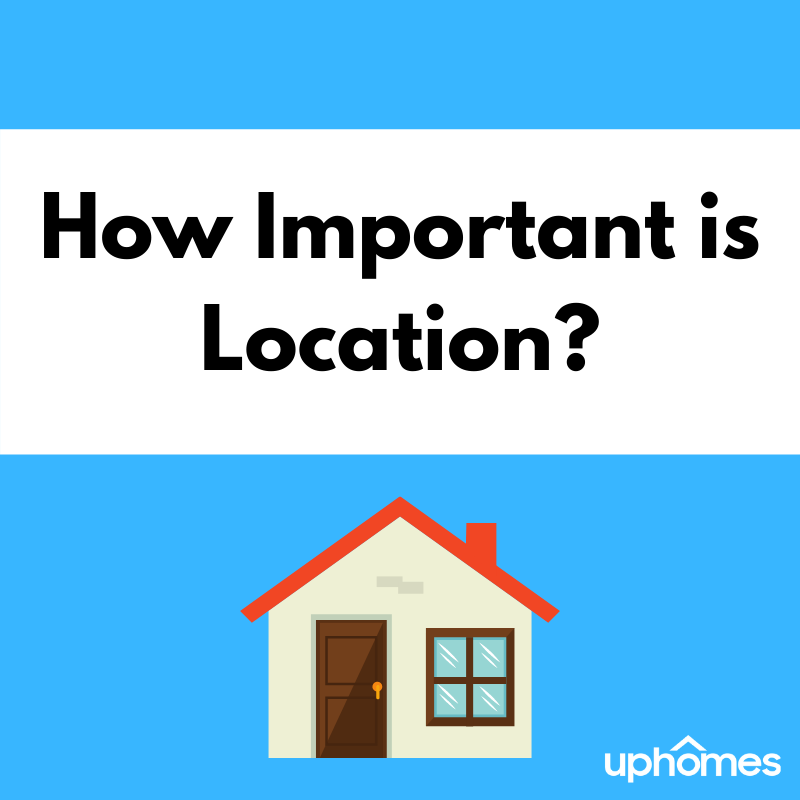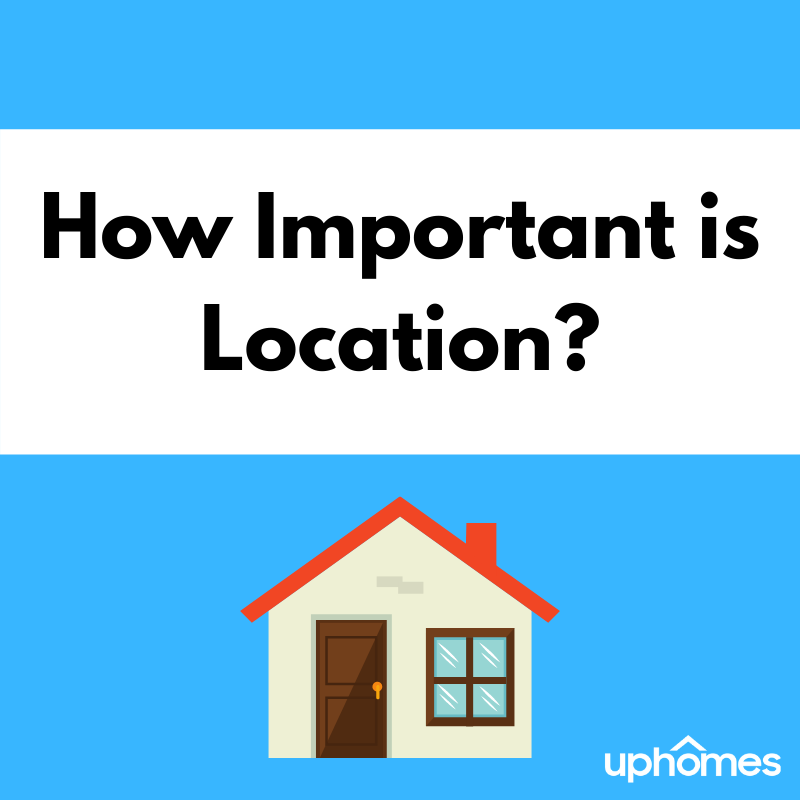January 03rd, 2021

How Important is Location When Buying a Home?

One of the most common questions we are asked is 'how important is location when buying a home.' Location is the most important factor in real estate. With all the home buying tips you will find on our website, location is without a doubt the most important factor in determining the property value of two like properties. There's a reason many great real estate investors refer to the phrase "location, location, location."
Let's take a look at what you need to know about location in real estate and the reasons why it is important when buying a home.
Desirability
Location is one of the things that homebuyers will be looking at when considering which property to purchase. Everyone wants a home in a location they find desirable. So what makes a location desirable? Things like schools, convenience, safety, and more! A central location is one of the best ways to determine desirability especially when it comes to the 'downtown' area of fast-growing cities.
The exact same property in a small, rural town or in the center of a major city is going to have a very different property value. This is what makes the location so important. In Charlotte, we have a ton of neighborhoods, it's the homes in Charlotte's best neighborhoods that will appreciate the most thanks to the area's desirability.
Highly developed cities that don't have a lot of land left for additional growth are typically forced to build 'up' instead of out. Areas like New York, San Francisco, even Charlotte's downtown area. Location is what allows a 2 bed, 800 square foot apartment to cost more than a 5 bedroom home with 4,000 square feet in some areas.
Schools
One of the things that many homebuyers will factor into their decision is the school system. People who have children are intending to have children are reasonably concerned with the quality of the school their child will be sent to. We even created a page on our website to help users find homes for sale by school district, that's how important they are to buyers!
Even for people that don't have children, the quality of the school system will impact the value of their home. This is true across the country. However, it might not be as important in a town that is retirement or vacation focused. Homes along beaches and secondary homes are typically not as concerned with school districts since it is a vacation home.
Crime
Everyone wants to live in a safe neighborhood. Neighborhoods that are known to have low crime are considered to be more ideal locations and therefore such higher property values.
In some cities, crime can be remarkably different block by block, especially in downtown neighborhoods. You can use crime rates and local crime reports from the Internet to help understand how safe and neighborhood is.
You can clearly see the impact of crime on property values by looking at some of the countries most expensive cities. The high cost of living cities like San Francisco and New York will have widely varying property values in different neighborhoods. If you take it upon yourself at the project, you will see that areas that have a high prevalence of crime will be much less expensive than those that have little to no crime.
In cities that have crime problems, some communities might be gated. Living in a gated community is seen as a safer and more secure option, and therefore these homes can fetch a higher price though not every area will offer a gated community option.
Transportation Options
One of the reasons that location is so important in real estate has to do with how people move around the neighborhood and city. Some property locations might make walking grocery stores, restaurants, entertainment, and shopping quite easy. Others might have easily accessible and safe public transportation options that allow people to easily travel around a busy city. Living in cities with great transportation options is seen as more desirable since you won't need to use your car all of the time, some folks may not even need a car with public transportation.
On the other hand, some cities and most rural locations require that people have a vehicle. In some areas of the country, the traffic is often quite bad and can make commutes and running errands much longer than they should be.
Amenities
Easy access to necessary amenities is another thing that factors into how desirable the location is. There is a big difference between being able to run to the grocery store in five minutes or having to drive 45 minutes to pick up a carton of eggs.
On top of the necessities, luxury amenities and other unessential services can also factor into how desirable a location is. Being able to walk or easily access a yoga studio, gym, popular restaurants, and shopping locations can make a location more desirable.
The Neighborhood
 American cities are often made up of many different neighborhoods that have their own characteristics and features. For example, living in Los Angeles can mean very different things to choose different families solely based on the neighborhood that they live in.
American cities are often made up of many different neighborhoods that have their own characteristics and features. For example, living in Los Angeles can mean very different things to choose different families solely based on the neighborhood that they live in.
Which neighborhoods appeal to you is certainly in part a matter of personal choice. However, many people will be interested in the amenities, appearance, and accessibility of the neighborhood. The type of neighborhood you live in can also dictate how big your lot is.
Many people want to live in neighborhoods that offer them a short commute to and from work. This means that they are looking for neighborhoods that have easy access to either public transportation or major roads.
The feeling you get from being in different neighborhoods can vary greatly based on their appearance. Houses with quality landscaping, large trees, and community spaces or parks tend to be much more appealing than those without these features.
The amenities available in the neighborhood are also quite important. There's a big difference between being able to stop at the grocery store in your own neighborhood and having to travel elsewhere. The school system and the crime rate also have a big impact on how appealing a neighborhood is.
Future Potential For Appreciation
The real estate market is not a fixed entity. On the contrary, it is always ebbing and flowing. Neighborhoods that are seen as undesirable now will likely be up-and-coming in a decade or two.
On the other hand, some neighborhoods might be at the beginning period of a decline in appreciation.
It isn't always possible to predict what will happen to a neighborhood over the course of years or decades. However, certain neighborhoods have the right factors to point to future appreciation potential.
Development
Another thing that factors then the desirability of property location is future plans for development. If there are plans for civic infrastructure like hospitals, public transportation, or new schools, it can improve property values in the area. This is also true when it comes to commercial development.
New Construction neighborhoods are likely to be popping up all over the area you live and you'll want to be sure you understand the future outlook of the neighborhood and area, it's one of the best new construction home buying tips we can give!
Lot Location
While the location of a home is important on a bigger scale, it's also important to take the specific lot's location into account.
Not all homes in the same neighborhood are created equal. People are not necessarily as interested in houses that are built right on a busy road are incredibly close to an interstate highway. Similarly, homes that are right next to commercial property or that are located on streets where there is a lot of parking traffic might not be as appealing.
On the other hand, houses that are located right on a body of water or that have a beautiful view tend to be more valuable than those that do not. A house that borders to park in the same neighborhood as one that borders a busy road, all other things the same, will likely have a higher value.
What Are the Other Factors That Impact Your Home's Value?
While property location is a big factor in your home value, that is of course not the only factor. Let's take a look at some of the other things that can impact your home's value.
The Local and National Real Estate Market
Both the national and your local real estate market will have an impact on your home's value especially in locations that are hit hardest during a recession.
For example, with interest rates at record lows and housing inventory also quite low, 2020 has been a booming seller's market. This is because there has been more demand than supply. However, if you look at the local markets in various areas of the country, you will notice that this is more true in some places than others.
On the other hand, when you look back to the 2008 financial crisis, the housing market was flooded with inventory. What this means is that there was more supply than demand and prices dropped.
The conditions of the market can also have an impact on how long it will take for your house to sell. If you're selling your house in a buyer's market, you will likely see your house sit on the market for longer. On the other hand, if you are selling in a seller's market, it is likely that your house will sell more quickly.
The reality is that even if your home is in the perfect location and in excellent condition, your local market international market can have an impact on your home value.
The Condition and Age of the House
The house itself is also, obviously, an important part of your home's value.
A home in pristine condition will fetch more money on the market been a home that needs a lot of work in the same location.
The age of the house will also be a factor. While older homes can be well-built and well maintained, they can be seen as requiring more upkeep and maintenance than your home.
Insurance Considerations
Another thing that people will take into account when looking at your home is insurance considerations. Some homes are positioned and high flood risk areas, where homeowners would be well advised to purchase additional flood insurance. Similarly, the cost of insurance can be impacted by a number of factors even the materials that the home was built out of.
Interest Rates
When interest rates are low, people are often willing to pay more money for houses. On the flip side, high-interest rates tend to lead to lower housing prices.
Both short-term interest rates and long-term interest rates can impact people's ability to be able to afford a home. If short-term interest rates rise, it can make people's short-term debt more expensive. This means that they might have less money in order to afford a home.
Size of Home and Property
Another crucial aspect of your home's market value is going to be the size of the home. Home values are often roughly estimated based upon a price per square foot. However, the price that buyers will pay for each square foot can widely vary.
Usable space is also a consideration in determining its value. This does not typically include unfinished basements, attics, and garages. The most important consideration for both appraisers and buyers is livable space.
In general, the most highly valued forms of usable space are bedrooms and bathrooms. Therefore, your home will tend to be work more and more bathrooms and bedrooms in your home.
Updates and Upgrades
Sometimes home improvement projects can help to add value to your home. This is particularly true in houses that are older whose features have become outdated. However, it's important to understand that not all updates and upgrades will leave you with a positive return on investment.
How much an upgrade impacts value of your home will depend on your local market and how much your home is already worth. For example, embarking on a project to finish a basement tends to be five times more valuable in Portland, Oregon than the same project in Atlanta, Georgia.
For less expensive homes, projects like adding a full bathroom or remodeling the kitchen can sometimes help to improve the property value. For larger and more expensive homes, updates such as installing wood floors are adding a pool can be a better investment.
There are also a number of different ways that are not necessarily major upgrades that can help boost your home value. Things like increasing your curb appeal and putting on a fresh coat of paint can be helpful in selling your house faster and for more money.
Location In Real Estate
Location in real estate is an incredibly important factor in your home's value and its perceived desirability by home buyers.
If you are considering selling your home, you might be wondering how much your home is worth and how your local market is doing. It can be a good idea to take a look at other comparable listings in your area to get a sense of how much similar properties are selling for. If you're searching homes for sale in Charlotte we can help you find one in a great location!

Ryan Fitzgerald
Hi there! My name is Ryan Fitzgerald, and I am a REALTOR®. My goal is to help you learn more about real estate through our Real Estate Blog! Hopefully, you enjoyed the above blog post and it found a way to provide help or value to you. When you're ready to buy or sell a home of your own let us know here. Please feel free to join the conversation by dropping us a comment below.

